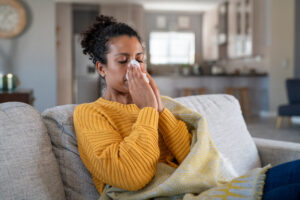Be On the Lookout for These Signs of Winter Allergies

Most people connect allergy season with spring, and cold season with winter. As a result, when kids acquire a runny or stuffy nose, itchy throat, watery eyes, or other similar symptoms, their initial impression is generally that they’re getting a cold.
Though it’s only September, it is the right time to learn about the potential signs of winter allergies so that you’re ready if you see them. If you have questions, or require allergy testing and/or treatment, contact Allergy, Asthma, and Immunology Medical Group at 805-658-9500 for help.
What are the causes of winter allergies?
Allergies to the cold are practically the same as allergies to the house. Allergies to indoor air can strike at any time of year, but they are more likely to trouble you in the winter. Common allergens like dust, pet hair, and mold spores can collect to higher levels than at other times of the year when buildings are closed up against the cold.
Due to the dry air, your symptoms may become worse in the winter. Your heating system can extract even more moisture from the air, leaving your mucus membranes vulnerable to becoming dry and sensitive. Winter air is naturally less humid than summer air, and your heating system can extract even more moisture from the air, leaving your mucus membranes vulnerable to becoming dry and sensitive.
Is it a cold or allergies?
While the symptoms of a common cold might vary, the disease usually follows a predictable pattern, with symptoms disappearing after 10 days. If your symptoms don’t fit this pattern, it’s quite probable that you’re suffering from winter allergies.
Winter allergies can cause symptoms to last for more than 10 days, or repeated episodes of symptoms that go away faster than a cold but return often.
If you normally have hay fever in the spring, summer, or fall, it’s possible you’re suffering from winter allergies rather than a cold. Individuals who are sensitive to pollens (a frequent cause of hay fever) are likely to react to indoor allergens as well.
What can you do to get rid of allergies in the winter?
The most obvious approach to alleviate winter allergies is to completely eliminate all allergens from your indoor environment. Cleaning or changing your HVAC filters, using an air purifier, brushing your pets more frequently, and using bedding intended to repel dust mites are all things you can do to help. It is, however, very hard to eliminate all allergies from your house. You won’t be able to modify the environment of other people’s homes or businesses if you visit there during the winter.
As a result, you may wish to seek guidance from an allergist regarding the best medicines for treating seasonal allergies. Make an appointment with Allergy, Asthma, and Immunology Medical Group by calling us at 805-658-9500 right away.



